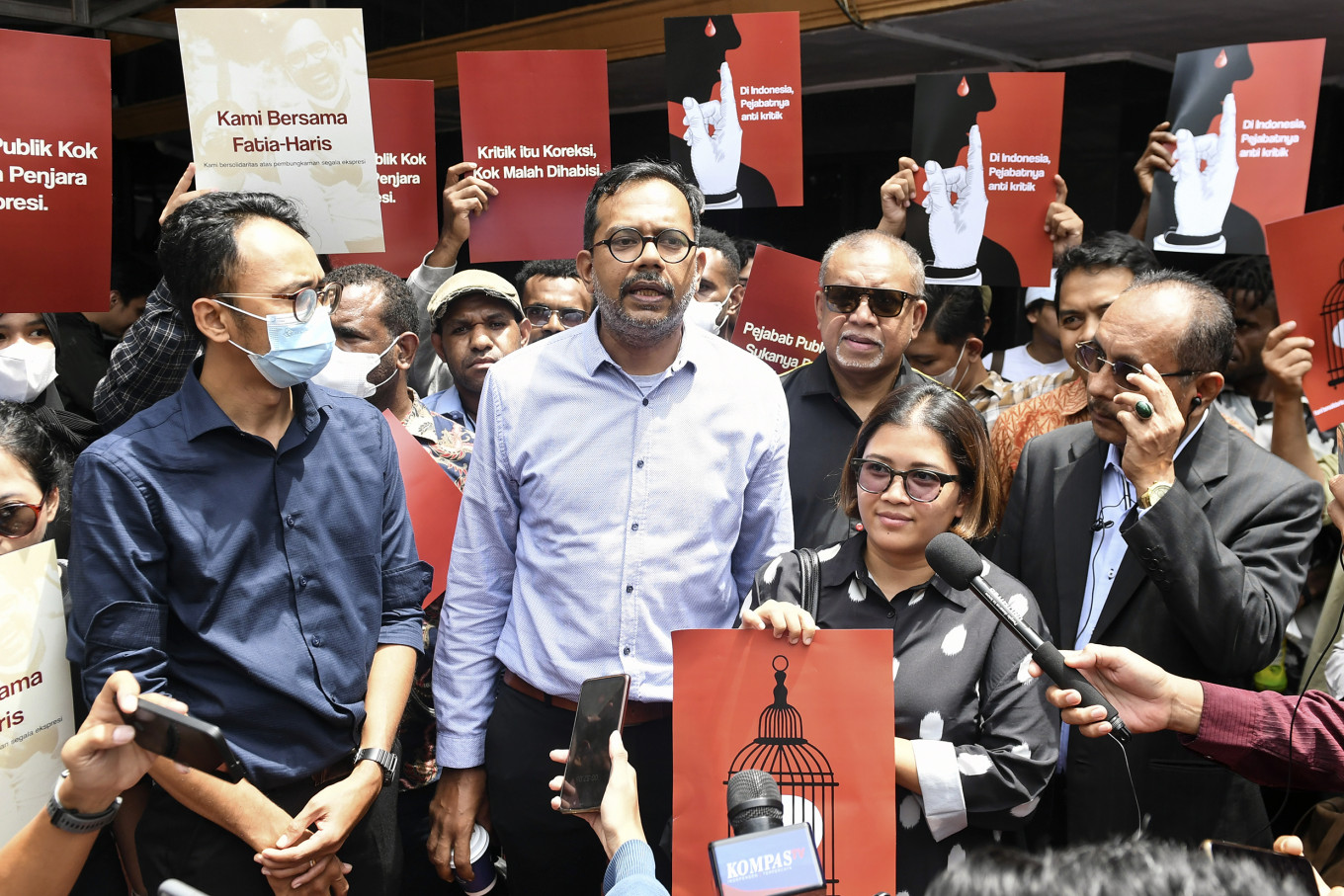Popular Reads
Top Results
Can't find what you're looking for?
View all search resultsPopular Reads
Top Results
Can't find what you're looking for?
View all search resultsProtecting rights defenders
Our democracy index may have gone up and down over the last five years, but there is no question that, overall, our democracy is in a terrible state.
Change text size
Gift Premium Articles
to Anyone
 Lokataru director Haris Azhar (second left) and Commission for Missing Persons and Victims of Violence (Kontras) coordinator Fatia Maulidiyanti (second right) respond to questions from journalists after attending a health check at the Jakarta Police's Health and Medical Center in South Jakarta on March 6. The police said the investigation dossiers of their defamation case against Maritime Affairs and Investment Minister Luhut Pandjaitan had been declared complete or P21 and ready to be handed over to the East Jakarta Prosecutor's Office (Kejari) for trial. ( Antara/Hafidz Mubarak A)
Lokataru director Haris Azhar (second left) and Commission for Missing Persons and Victims of Violence (Kontras) coordinator Fatia Maulidiyanti (second right) respond to questions from journalists after attending a health check at the Jakarta Police's Health and Medical Center in South Jakarta on March 6. The police said the investigation dossiers of their defamation case against Maritime Affairs and Investment Minister Luhut Pandjaitan had been declared complete or P21 and ready to be handed over to the East Jakarta Prosecutor's Office (Kejari) for trial. ( Antara/Hafidz Mubarak A)
I
t is of great concern that the state of civic space in Indonesia continues to deteriorate under the President Joko “Jokowi” Widodo administration. Indonesia may never aspire to become a liberal democracy, but the growing onslaught on our civil liberties is just inexcusable.
The Economist Intelligence Unit (EIU), which analyzes the quality of global democracy, has consistently labeled Indonesia a “flawed democracy”. In its 2022 report, the country fell from 52nd to 54th place in the global democracy index, with an overall score of 6.71. Indonesia, scoring 6.14 for its commitment to civil liberties, is now less democratic than the Philippines, which scored 7.35 for the same variable.
Our democracy index may have gone up and down over the last five years, but there is no question that, overall, our democracy is in a terrible state. Political scientists can point to a number of factors to explain why that is the case, but we the people can easily tell our civic space is getting uncomfortably smaller as we experience the chilling effect of a series of legal and even physical intimidations against human rights defenders.
Only recently, two high-profile human rights defenders, Haris Azhar and Fatia Maulidiyanti, were indicted for allegedly defaming senior Cabinet member Luhut Binsar Pandjaitan in a YouTube video highlighting the controversial mining activities and the growing military presence in the central highlands of Papua.
They were charged under the 2016 Electronic Information and Transaction (ITE) Law, which is currently being amended due to public protests over its draconian provisions. The law has been frequently used by the powers that be to silence online critics, particularly human rights defenders, defined by the United Nations as those “seeking the promotion and protection of civil and political rights as well as the promotion, protection and realization of economic, social and cultural rights”.
It is worth noting that the case against Haris and Fatia may have gained more public attention because they are both renowned activists based in the capital. In the regions, the situation is so much worse for some of the lesser-known human rights defenders.
Amnesty International Indonesia recorded at least 328 cases of physical and digital violence against at least 834 people who can be classified human rights defenders from January 2019 to May 2022. The cases include at least 13 murder attempts and murder threats against 17 human rights defenders, the international rights group said. And in most of these cases, the law enforcers often failed to bring the perpetrators to justice, prolonging the culture of impunity in the country, it added.
In January 2019, the residence of Murdani, the executive director of the West Nusa Tenggara chapter of environmental group Walhi, was set on fire by arsonists. Based on Amnesty’s investigation, a group of people lighted a gasoline-soaked pillow under Murdani’s car that was parked next to his house. They also allegedly burned two of the house’s doors in their attempt to prevent the family from escaping.
Prior to the incident, Murdani had been advocating for the rights of the local farmers protesting the sand mining activities in their village. In 2016, he was texted this threat: “If you want to live, stop meddling in the sand mining business.”
In Banyuwangi, East Java, an environmental activist was recently sent to jail after being convicted of the dubious crime of spreading communism. The activist in question, Budi Pego, was arrested after holding a rally protesting the gold mining activities in Sumberagung village, during which a group of intruders allegedly displayed a banner featuring a hammer and sickle symbol.
Such incidents are extremely alarming, especially when we know that the human rights defenders are only trying protect the people’s right to a safe and healthy environment. A true democracy will never let this slide.










